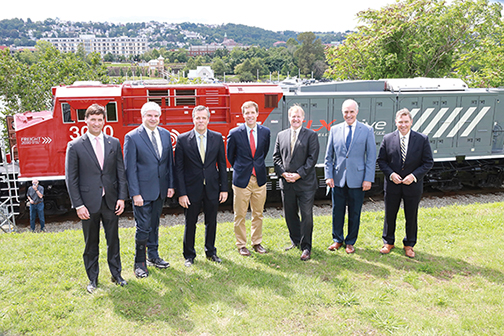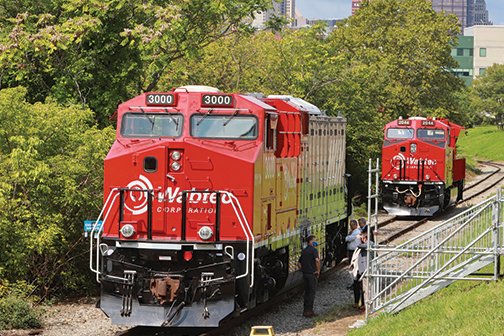
Headquartered by the banks of the Allegheny River, Wabtec has been a part of Pittsburgh and the Pennsylvania business community for more than 150 years. The company was founded by George Westinghouse in 1869 and, today, is a leader in freight rail, manufacturing advanced locomotives, freight rail parts and components, as well as advanced network logistics and digital solutions. Wabtec has grown to more than 27,000 employees in more than 50 countries. Today, the company is the largest freight locomotive manufacturer, moving more than 20 percent of the world’s freight.
Like the city it calls home, Wabtec is steeped in the spirit of innovation. It has redefined the transportation industry. The company is reinventing ways of doing things better, safer, and more sustainably.
It all started with George Westinghouse’s invention of the world’s first air brake system back in 1872. This revolutionary breakthrough improved the efficiency and safety of the rail industry. The automatic system used pressurized air to quickly apply the brakes throughout the train. It eliminated the dangerous work required of brakemen, who had to manually set the brakes. The air brake system remains the primary method of stopping a train to this day.
The company built upon that breakthrough with other innovations that shaped the rail industry like the first electric locomotive and the first pantograph. Those inventions were followed by more recent breakthroughs such as the first diesel-electric locomotive meeting the EPA’s stringent Tier 4 emission requirement without after treatment system, the first AC electric drive system for mining trucks and the first, fully electronic brake control system for commuter rail systems. Wabtec’s strong track record of being the first to bring innovative technologies to market has established its reputation of industry leader.
Helping the “Freight 2030” Vision Come to Life
 Wabtec is taking the next step in its journey to transform the rail industry with its “Freight 2030” vision. This joint effort with Carnegie Mellon University and Genesee & Wyoming is working to decarbonize freight rail transport, improve freight safety, and generate greater rail network utilization.
Wabtec is taking the next step in its journey to transform the rail industry with its “Freight 2030” vision. This joint effort with Carnegie Mellon University and Genesee & Wyoming is working to decarbonize freight rail transport, improve freight safety, and generate greater rail network utilization.
To accelerate this effort, Carnegie Mellon University, Genesee & Wyoming and Wabtec aspire to create the Freight Rail Innovation Institute — the first-of-its-kind effort to create zero-emission locomotives; develop technology that increases freight rail utilization; improve safety by 50 percent; and create 250,000 jobs by 2030.
Wabtec’s goal is to develop the next generation of zero-emission locomotives. The company has a clear path to power new locomotives — and repower existing locomotives — with batteries, hydrogen internal combustion engines, and eventually hydrogen fuel cells. This year, Wabtec designed and built the world’s first 100 percent, battery-electric locomotive called the FLXdrive. The battery locomotive demonstrated its capabilities in revenue operations during a three-month pilot in California, covering more than 13,000 miles of track. The FLXdrive, operating at 2.4 megawatt hours, successfully reduced overall fuel consumption by more than 11 percent across the entire locomotive consist — saving over 6,200 gallons of diesel fuel and reducing approximately 69 tons of CO2 emissions. The company is developing the next generation of the FLXdrive, which will operate at more than 7 megawatt hours. It will reduce fuel consumption by up to 30 percent across the train. Each diesel-powered locomotive converted to alternative energy sources can save up to 3,000 tons of CO2 per year.
 The second part of the “Freight 2030” initiative focuses on increasing rail utilization. Studies have highlighted that while improvements to infrastructure are important, there is significant opportunity to extract more useful capacity from the existing network. Advancements to current signaling systems and other utilization technologies can increase network capacity by 50 percent without adding a single piece of track. The potential for emission savings is tremendous. If 50 percent of truck traffic over 500 miles was moved to rail, emissions would fall by approximately 60 million tons per year.
The second part of the “Freight 2030” initiative focuses on increasing rail utilization. Studies have highlighted that while improvements to infrastructure are important, there is significant opportunity to extract more useful capacity from the existing network. Advancements to current signaling systems and other utilization technologies can increase network capacity by 50 percent without adding a single piece of track. The potential for emission savings is tremendous. If 50 percent of truck traffic over 500 miles was moved to rail, emissions would fall by approximately 60 million tons per year.
To maximize utilization across the nation’s mainline rail network, which is the cleanest, safest and most efficient way to move goods over land, Wabtec and Carnegie Mellon University will play leading roles in developing the engineering technologies that bring together the data, logistics and intelligence needed to optimize rail operations, while reducing emissions. Through next-gen technology such as dynamic network and on-demand logistics planning, Wabtec can optimize heavy-haul operations, increase yard capacity and cargo visibility, and grow “first and last” mile operations.
With the combination of improvements in freight rail utilization and developments in zero-emission locomotive technology, the “Freight 2030” vision would enable the United States to eliminate of up to 120 million tons of emissions per year.
Wabtec continues Pennsylvania’s long, proud history in railroads and railroad manufacturing. Their efforts to transform the rail industry will improve the environment, increase safety and spur job growth for years to come.